Serving 1,336 students in grades 7-8, Longwood Junior High School ranks in the top 50% of all schools in New York for overall test scores (math proficiency is top 50%, and reading proficiency is top 50%).
The percentage of students achieving proficiency in math is 57% (which is higher than the New York state average of 46%). The percentage of students achieving proficiency in reading/language arts is 45-49% (which is approximately equal to the New York state average of 49%).
The student:teacher ratio of 13:1 is higher than the New York state level of 11:1.
Minority enrollment is 62% of the student body (majority Hispanic), which is higher than the New York state average of 60% (majority Hispanic).
Quick Stats (2025)
- Grades: 7-8
- Enrollment: 1,336 students
- Student:Teacher Ratio: 13:1
- Minority Enrollment: 62%
- Overall Testing Rank: Top 50% in NY
- Math Proficiency: 57% (Top 50%)
- Reading Proficiency: 45-49% (Top 50%)
- Science Proficiency: ≥95% (Top 5%)
- Source: National Center for Education Statistics (NCES), NY Dept. of Education
Top Rankings
Longwood Junior High School ranks among the top 20% of public schools in New York for:
Category
Attribute
Science Proficiency
Diversity
School Overview
Longwood Junior High School's student population of 1,336 students has declined by 10% over five school years.
The teacher population of 104 teachers has stayed relatively flat over five school years.
Grades Offered
Grades 7-8
(offers virtual instruction)
(offers virtual instruction)
Total Students
1,336 students
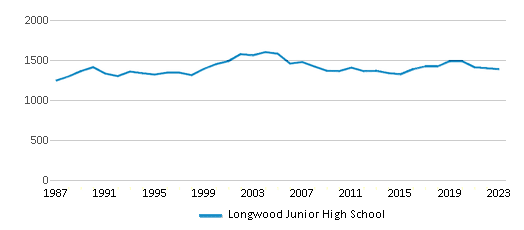
Gender %
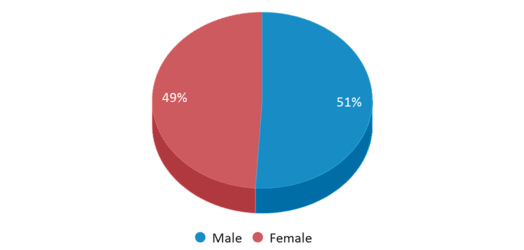
Total Classroom Teachers
104 teachers
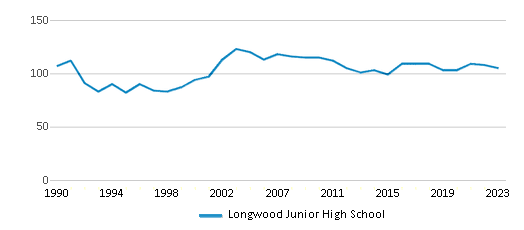
Students by Grade
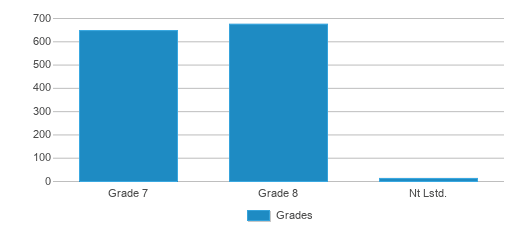
School Rankings
Longwood Junior High School ranks within the top 50% of all 4,377 schools in New York (based off of combined math and reading proficiency testing data).
The diversity score of Longwood Junior High School is 0.72, which is equal to the diversity score at state average of 0.72. The school's diversity has stayed relatively flat over five school years.
Overall Testing Rank
#1757 out of 4377 schools
(Top 50%)
(Top 50%)
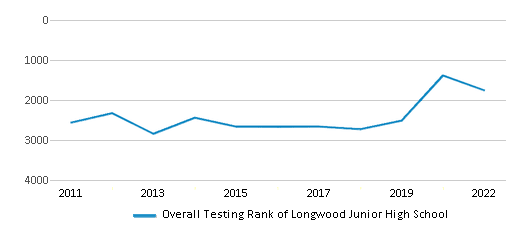
Math Test Scores (% Proficient)
57%
46%
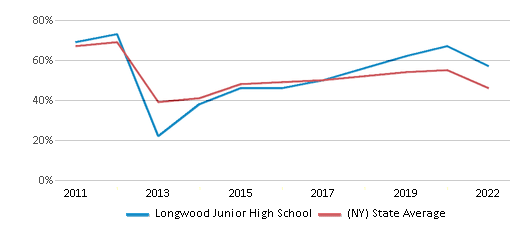
Reading/Language Arts Test Scores (% Proficient)
45-49%
49%
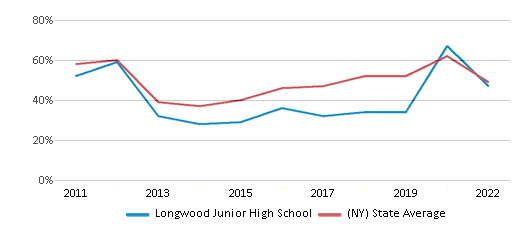
Science Test Scores (% Proficient)
≥95%
78%
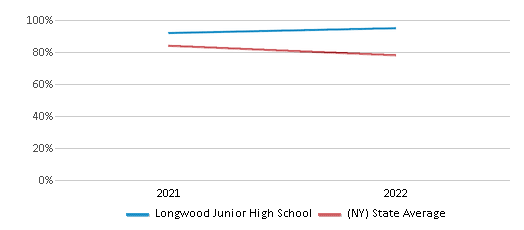
Student : Teacher Ratio
13:1
11:1
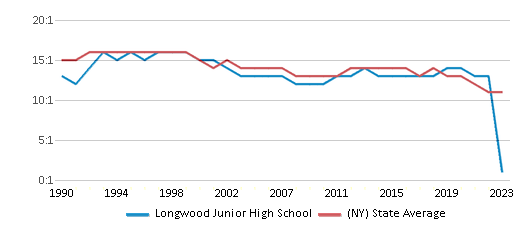
American Indian
1%
1%
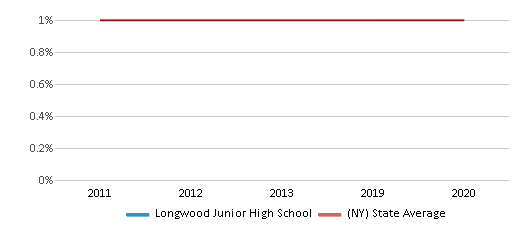
Asian
3%
10%
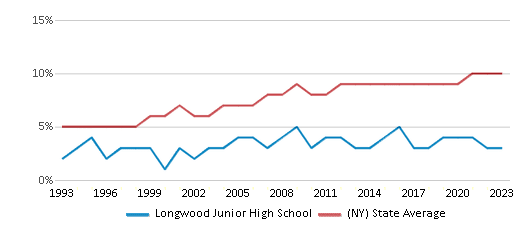
Hispanic
32%
30%
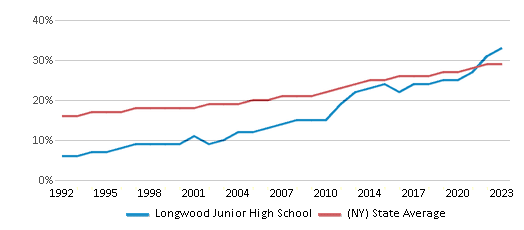
Black
20%
16%
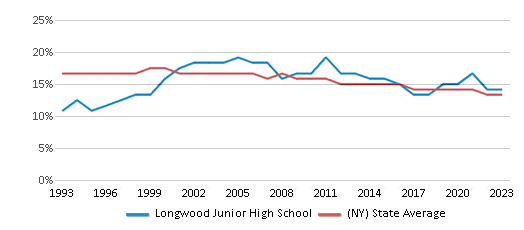
White
38%
40%
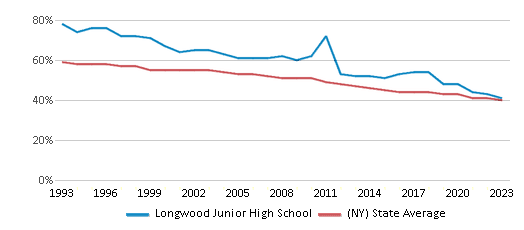
Hawaiian
n/a
n/a
Two or more races
6%
3%
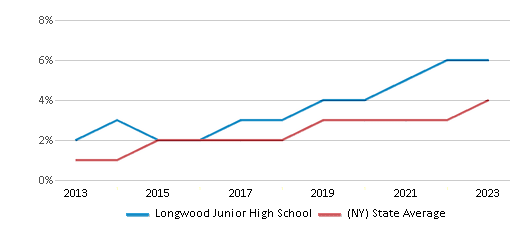
All Ethnic Groups
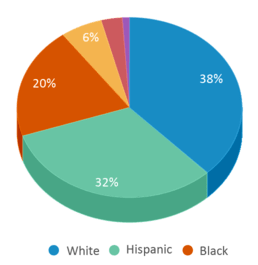
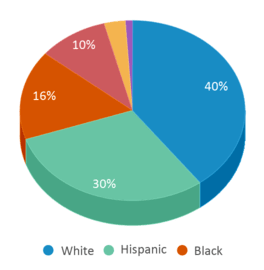
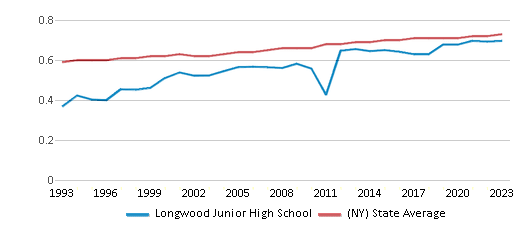
Participates in the National School Lunch Program (NSLP)
Yes
Eligible for Free Lunch
46%
54%
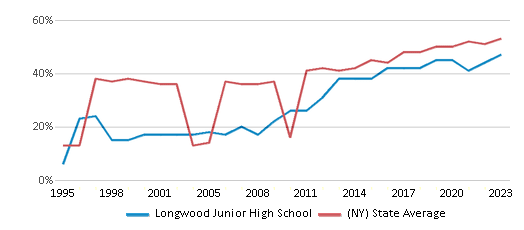
Eligible for Reduced Lunch
1%
3%
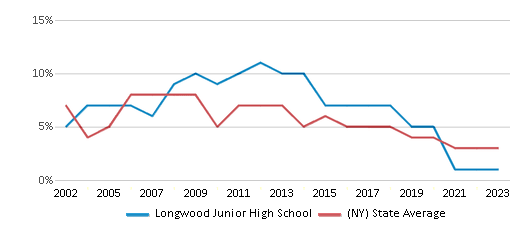
School Statewide Testing
School District Name
Source: National Center for Education Statistics (NCES), NY Dept. of Education
Profile last updated: 02/09/2025
Frequently Asked Questions
What is Longwood Junior High School's ranking?
Longwood Junior High School is ranked #1757 out of 4,377 schools, which ranks it among the top 50% of public schools in New York.
What schools are Longwood Junior High School often compared to?
Longwood Junior High Schoolis often viewed alongside schools like Bellport Middle School by visitors of our site.
What percent of students have achieved state testing proficiency in math and reading?
57% of students have achieved math proficiency (compared to the 46% NY state average), while 45-49% of students have achieved reading proficiency (compared to the 49% NY state average).
How many students attend Longwood Junior High School?
1,336 students attend Longwood Junior High School.
What is the racial composition of the student body?
38% of Longwood Junior High School students are White, 32% of students are Hispanic, 20% of students are Black, 6% of students are Two or more races, 3% of students are Asian, and 1% of students are American Indian.
What is the student:teacher ratio of Longwood Junior High School?
Longwood Junior High School has a student ration of 13:1, which is higher than the New York state average of 11:1.
What grades does Longwood Junior High School offer ?
Longwood Junior High School offers enrollment in grades 7-8 (offers virtual instruction).
What school district is Longwood Junior High School part of?
Longwood Junior High School is part of Longwood Central School District.
School Reviews
5 2/17/2024
I love my school.
1 4/26/2021
I hate this school. I'm dread coming here. The dress code is so extra for no reason. Especially for girls and it's completely unfair. The student's here are flat out rude. People don't know how to be respectful and just follow instructions. It honestly feels unsafe too. There are fights quite often. This should not be happening at any school. I hate that there are so many kids. I'm a new kid who used to go to a school with 60 kids in my grade and coming here makes me so uncomfortable and I feel so squished everywhere I go. It's never just calm. People are yelling from across the halls and getting in each other's way. And I've been pushed so many times. The overwhelming amount of student's in the halls makes me sometimes late to my classes. All the teachers don't really seem to care about anything than you turning in your assignments on time. If I could move away, I would.
Review Longwood Junior High School. Reviews should be a few sentences in length. Please include any comments on:
- Quality of academic programs, teachers, and facilities
- Availability of music, art, sports and other extracurricular activities
Recent Articles

What Is A Charter School?
Explore the world of charter schools in this comprehensive guide. Learn about their history, how they operate, and the pros and cons of this educational innovation. Discover key facts about charter schools, including admission policies, demographics, and funding, as well as what to look for when considering a charter school for your child.

10 Reasons Why High School Sports Benefit Students
Discover the 10 compelling reasons why high school sports are beneficial for students. This comprehensive article explores how athletics enhance academic performance, foster personal growth, and develop crucial life skills. From improved fitness and time management to leadership development and community representation, learn why participating in high school sports can be a game-changer for students' overall success and well-being.

February 05, 2025
Understanding the U.S. Department of Education: Structure, Impact, and EvolutionWe explore how the Department of Education shapes American education, from its cabinet-level leadership to its impact on millions of students, written for general audiences seeking clarity on this vital institution.









